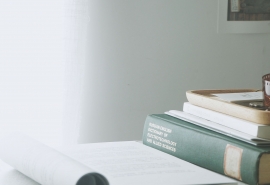
一般疑问句造句
一般疑问句造句一般疑问句概述
一般疑问句(general questions),也可称为“yes/no” questions(是否型问句),因为它一般是由yes或no回答的,如:
—Can you swim to the other side?
你能游到对岸吗?
—Yes, I can.是的,我能。
—No,I can’t.不,我不能。
—Ha//www.souquanme.comve you locked the door?
你锁门了吗?
—Yes,I have.是的,锁了。
—No,I haven’t. 不,没有锁。
2一般疑问句的结构
(1)基本的结构为:be/助动词/情态动词+主语+谓语/表语+(其他),句子要读升调,如:
Are they your friends?
他们是你的朋友吗?
Does he go to school on foot?
他是步行去上学吗?
Will you be free tonight?你今晚有空吗?
Can you play basketball?你会打篮球吗?
(2)陈述句亦可用作一般疑问句,多用在非正式文体中,句末有问号,用升调,如:
Somebody is with you?
有人和你一起吗?
He didn’t finish the work?
他没有做完活吗? ?
一般疑问句(general questions),也可称为“yes/no” questions(是否型问句),因为它一般是由yes或no回答的,如:
—Can you swim to the other side?
你能游到对岸吗?
—Yes, I can.是的,我能。
—No,I can’t.不,我不能。
—Ha//www.souquanme.comve you locked the door?
你锁门了吗?
—Yes,I have.是的,锁了。
—No,I haven’t. 不,没有锁。
2一般疑问句的结构
(1)基本的结构为:be/助动词/情态动词+主语+谓语/表语+(其他),句子要读升调,如:
Are they your friends?
他们是你的朋友吗?
Does he go to school on foot?
他是步行去上学吗?
Will you be free tonight?你今晚有空吗?
Can you play basketball?你会打篮球吗?
(2)陈述句亦可用作一般疑问句,多用在非正式文体中,句末有问号,用升调,如:
Somebody is with you?
有人和你一起吗?
He didn’t finish the work?
他没有做完活吗? ?
一般疑问句的造句
一般疑问句的造句,十句一般疑问句概述
一般疑问句(general questions),也可称为“yes/no” questions(是否型问句),因为它一般是由yes或no回答的,如:
—Can you swim to the other side?
你能游到对岸吗?
—Yes, I can.是的,我能。
—No,I can’t.不,我不能。
—Have you locked the door?
你锁门了吗?
—Yes,I have.是的,锁了。
—No,I haven’t. 不,没有锁。
2一般疑问句的结构
(1)基本的结构为:be/助动词/情态动词+主语+谓语/表语+(其他),句子要读升调,如:
Are they your friends?
他们是你的朋友吗?
Does he go to school on foot?
他是步行去上学吗?
Will you be free tonight?你今晚有空吗?
Can you play basketball?你会打篮球吗?
(2)陈述句亦可用作一般疑问句,多用在非正式文体中,句末有问号,用升调,如:
Somebody is with you?
有人和你一起吗?
He didn’t finish the work?
他没有做完活吗? ?
一般疑问句(general questions),也可称为“yes/no” questions(是否型问句),因为它一般是由yes或no回答的,如:
—Can you swim to the other side?
你能游到对岸吗?
—Yes, I can.是的,我能。
—No,I can’t.不,我不能。
—Have you locked the door?
你锁门了吗?
—Yes,I have.是的,锁了。
—No,I haven’t. 不,没有锁。
2一般疑问句的结构
(1)基本的结构为:be/助动词/情态动词+主语+谓语/表语+(其他),句子要读升调,如:
Are they your friends?
他们是你的朋友吗?
Does he go to school on foot?
他是步行去上学吗?
Will you be free tonight?你今晚有空吗?
Can you play basketball?你会打篮球吗?
(2)陈述句亦可用作一般疑问句,多用在非正式文体中,句末有问号,用升调,如:
Somebody is with you?
有人和你一起吗?
He didn’t finish the work?
他没有做完活吗? ?
一般疑问句例句
一、什么是一般疑问句
疑问句总共分为4种类型,一般疑问句就是其中之一。在通常情况下,一般疑问句只能用yes或no来回答。一般疑问句也是初中英语教材中核心的语法知识点。
二、一般疑问句的结构
1、一般疑问句通常以be动词、助动词或情态动词为首,后跟主语,再接句子的相关成分,例:
Are you from Beijing?
你是来自北京的吗?(are为be动词,you为主语)
Do you work in a bank?
你在一家银行工作吗?(do为助动词,you为主语)
May I borrow your book?
我能借你的书用一下吗?(may为情态动词,I为主语)
2、一般疑问句的回答,通搜趣网常为以下结构:
肯定:Yewww.souquanme.coms,主语+提问的be/助动词/情态动词.
否定:No,主语+提问的be/助动词/情态动词的否定形式.
例句:
Are you from Japan﹖
Yes, I am. / No, I'm not.
Do you work in a bank?
Yes, I do. / No, I don't.
May I borrow your book?
Yes, you may. / No, you mustn't.
三、肯定句改一般疑问句的规则
1. 肯定句中有some,就把some变成any。
例句:
There are some apples on the table.
Are there any apples on the table?
2.肯定句中有be动词(are/is)就把be动词提到句首。
例句:
You are a teacher.
Are you a teacher?
3.肯定句中有be动词的过去式(was/were),将其提到句首。
例句:
You were a doctor.
Were you a doctor?
4. 肯定句中有情态动词(can/could/will/would/shall/may/must),将其提到句首。
例句:
I may go home now.
May I go home now?
5. 肯定句中有had better,就把Had提到句首。
例句:
I'd better go now.
Had I better go now?
6. 肯定句中有肯定句中有搜趣网实义动词原型,就在句首加Do。
例句:
I work in a bank.
Do you work in a bank?
7. 肯定句中有实义动词三单现,就在句首加Does, 实义动词三单现变回实义动词原型。
例句:
He works in a bank
Does he works in a bank.
8. 肯定句中有实义动词过去式,就在句首加Did, 实义动词过去式变回实义动词原型。
例句:
He told you.
Did he tell you?
9. 肯定句是I am… ,就把I am…变成Are yo//www.souquanme.comu….。
例句:
I am a Chinese.
Are you a Chinese.
10. 变一般疑问句时,肯定句I was… ,就把I was…变成Were you…。
例句:
I was a teacher.
Were you a teacher.
疑问句总共分为4种类型,一般疑问句就是其中之一。在通常情况下,一般疑问句只能用yes或no来回答。一般疑问句也是初中英语教材中核心的语法知识点。
二、一般疑问句的结构
1、一般疑问句通常以be动词、助动词或情态动词为首,后跟主语,再接句子的相关成分,例:
Are you from Beijing?
你是来自北京的吗?(are为be动词,you为主语)
Do you work in a bank?
你在一家银行工作吗?(do为助动词,you为主语)
May I borrow your book?
我能借你的书用一下吗?(may为情态动词,I为主语)
2、一般疑问句的回答,通搜趣网常为以下结构:
肯定:Yewww.souquanme.coms,主语+提问的be/助动词/情态动词.
否定:No,主语+提问的be/助动词/情态动词的否定形式.
例句:
Are you from Japan﹖
Yes, I am. / No, I'm not.
Do you work in a bank?
Yes, I do. / No, I don't.
May I borrow your book?
Yes, you may. / No, you mustn't.
三、肯定句改一般疑问句的规则
1. 肯定句中有some,就把some变成any。
例句:
There are some apples on the table.
Are there any apples on the table?
2.肯定句中有be动词(are/is)就把be动词提到句首。
例句:
You are a teacher.
Are you a teacher?
3.肯定句中有be动词的过去式(was/were),将其提到句首。
例句:
You were a doctor.
Were you a doctor?
4. 肯定句中有情态动词(can/could/will/would/shall/may/must),将其提到句首。
例句:
I may go home now.
May I go home now?
5. 肯定句中有had better,就把Had提到句首。
例句:
I'd better go now.
Had I better go now?
6. 肯定句中有肯定句中有搜趣网实义动词原型,就在句首加Do。
例句:
I work in a bank.
Do you work in a bank?
7. 肯定句中有实义动词三单现,就在句首加Does, 实义动词三单现变回实义动词原型。
例句:
He works in a bank
Does he works in a bank.
8. 肯定句中有实义动词过去式,就在句首加Did, 实义动词过去式变回实义动词原型。
例句:
He told you.
Did he tell you?
9. 肯定句是I am… ,就把I am…变成Are yo//www.souquanme.comu….。
例句:
I am a Chinese.
Are you a Chinese.
10. 变一般疑问句时,肯定句I was… ,就把I was…变成Were you…。
例句:
I was a teacher.
Were you a teacher.





